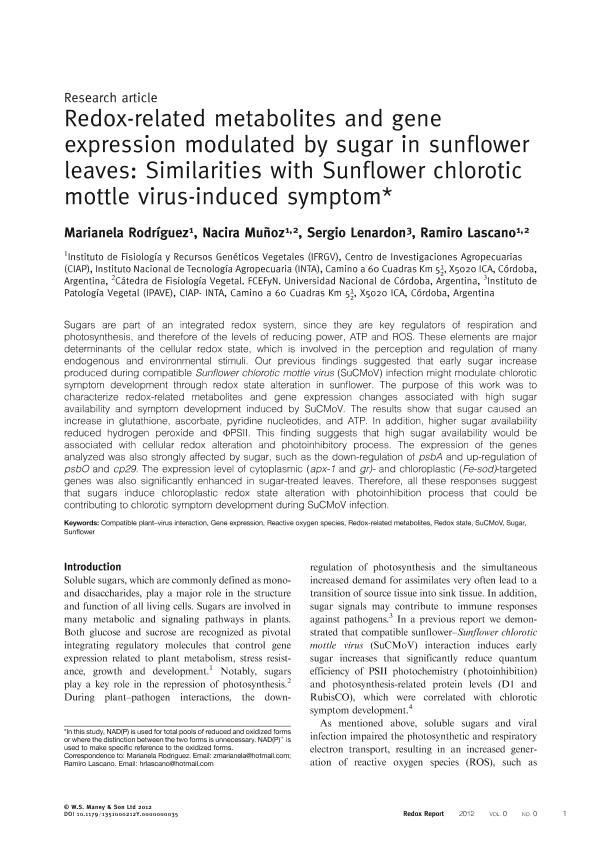Artículo
Redox-related metabolites and gene expression modulated by sugar in sunflower leaves: Similarities with Sunflower chlorotic mottle virus-induced symptom
Fecha de publicación:
07/2013
Editorial:
Taylor & Francis
Revista:
Redox Report
ISSN:
1351-0002
Idioma:
Inglés
Tipo de recurso:
Artículo publicado
Clasificación temática:
Resumen
Sugars are part of an integrated redox system, since they are key regulators of respiration and photosynthesis, and therefore of the levels of reducing power, ATP and ROS. These elements are major determinants of the cellular redox state, which is involved in the perception and regulation of many endogenous and environmental stimuli. Our previous findings suggested that early sugar increase produced during compatible Sunflower chlorotic mottle virus (SuCMoV) infection might modulate chlorotic symptom development through redox state alteration in sunflower. The purpose of this work was to characterize redox-related metabolites and gene expression changes associated with high sugar availability and symptom development induced by SuCMoV. The results show that sugar caused an increase in glutathione, ascorbate, pyridine nucleotides, and ATP. In addition, higher sugar availability reduced hydrogen peroxide and ΦPSII. This finding suggests that high sugar availability would be associated with cellular redox alteration and photoinhibitory process. The expression of the genes analyzed was also strongly affected by sugar, such as the down-regulation of psbA and up-regulation of psbO and cp29. The expression level of cytoplasmic (apx-1 and gr)- and chloroplastic (Fe-sod)-targeted genes was also significantly enhanced in sugar-treated leaves. Therefore, all these responses suggest that sugars induce chloroplastic redox state alteration with photoinhibition process that could be contributing to chlorotic symptom development during SuCMoV infection.
Palabras clave:
Redox-Related Metabolites
,
Sucmov
,
Gene Expression
,
Sugar
Archivos asociados
Licencia
Identificadores
Colecciones
Articulos(CCT - CORDOBA)
Articulos de CTRO.CIENTIFICO TECNOL.CONICET - CORDOBA
Articulos de CTRO.CIENTIFICO TECNOL.CONICET - CORDOBA
Citación
Rodriguez, Marianela Soledad; Muñoz, Nacira Belén; Lenardon, Sergio Luis; Lascano, Hernan Ramiro; Redox-related metabolites and gene expression modulated by sugar in sunflower leaves: Similarities with Sunflower chlorotic mottle virus-induced symptom; Taylor & Francis; Redox Report; 18; 1; 7-2013; 27-35
Compartir
Altmétricas




